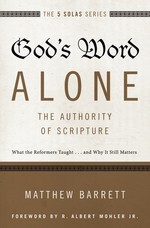 God’s Word Alone—The Authority of Scripture: What the Reformers Taught…and Why It Still Matters
God’s Word Alone—The Authority of Scripture: What the Reformers Taught…and Why It Still Matters
by Matthew Barrett
Series: The 5 Solas Series
Paperback, 374 pg.
Zondervan, 2016
Read: January 8 – 22, 2016

For this installment in The 5 Solas Series focuses on the material principle of the Reformation, Sola Scriptura. Despite being almost 200 pages longer than VanDrunen’s entry in this series (the benefit of being the series editor is that you get more space?), this book is too short for what it tries to accomplish. Which is really the long way around for me to say that this book tries to do too much — and ends up giving shallow presentations to things that deserve more.
Part 1 is an exploration of the understanding of — and challenges to — Biblical Authority around the time of the Reformation and through history since then. While Barrett gives a strong and competent explanation of these themes, I couldn’t help feeling that I’ve read them before — frequently — by other authors.
Part 2, an exploration of the doctrine of Scripture/The Word of God throughout Redemptive History, I thought was very promising. This could be the backbone of a very compelling study, and I hope someone takes Barrett’s work here and builds on, expands and deepens it (if someone has already written this book — please tell me!). It’s probably here most of all, that I noticed how much space forced Barrett to stick to the surface of this subject rather than exploring it in the depth it asks for.
Part 3 was a more polemical/apologetic focus — discussing challenges to the Authority of God’s Word. This was probably the strongest part of the book — in particular, I thought his chapter on Innerrancy was pure gold. Nothing new or particularly insightful was offered in this section, but there seemed to be a bit more passion, a bit more energy to this Part.
This is the second in The 5 Solas Series that I’ve read, and the second that I was underwhelmed by. It’s good, but does little to commend it above many other titles on the subject. Barrett knows the subject, explains it well, but doesn’t inspire the reader to anything. I don’t mean to suggest by my frequent notes that “there was nothing new” that I need novelty — I prefer a lack of novelty to my theology. But I do want something about a book to stand out in the way it discusses things before I can really get excited about/impressed with a book.
—–



Read Irresponsibly, but please Comment Responsibly